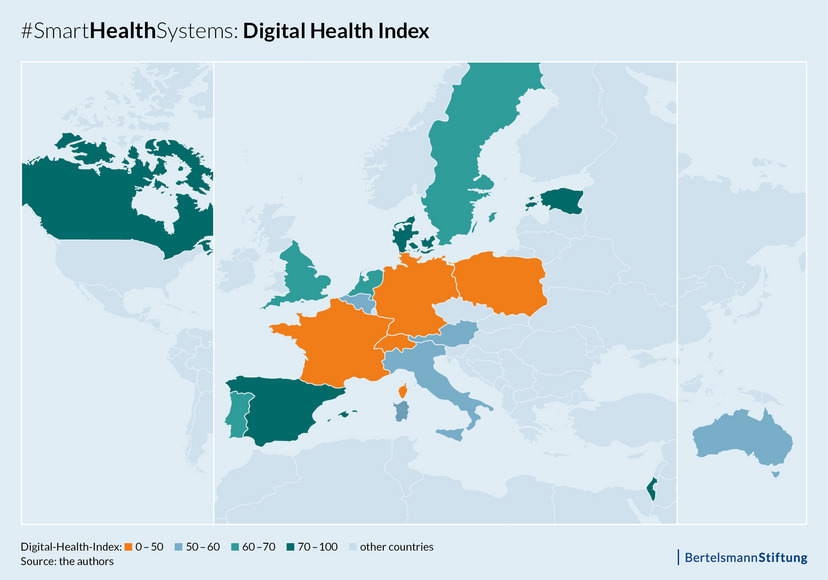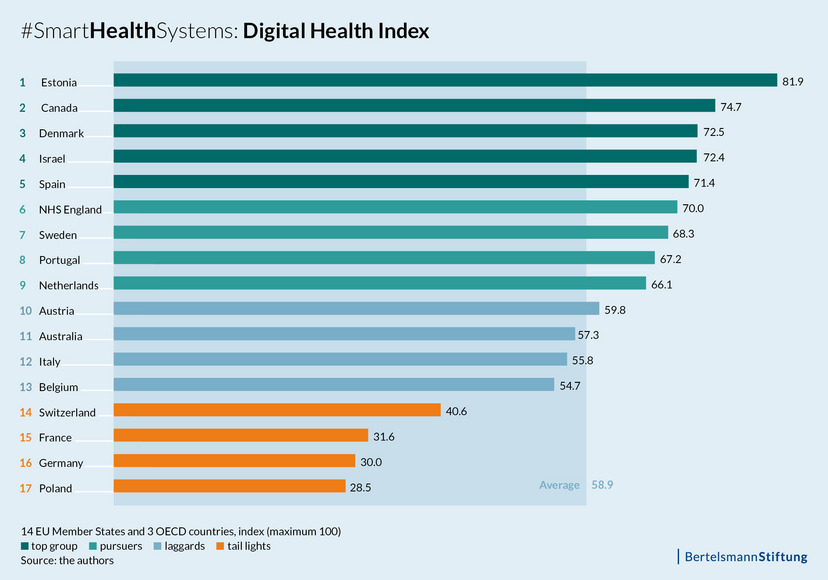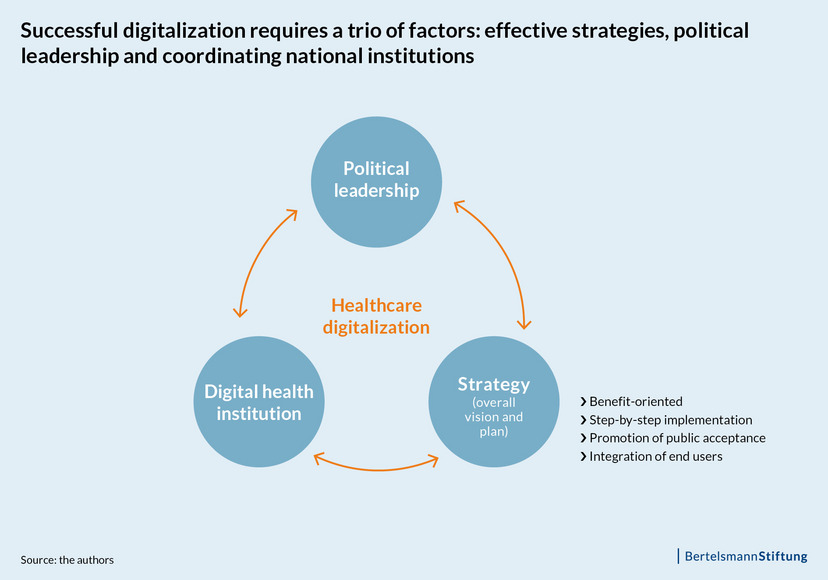Digital Health has a significant potential to improve public healthcare delivery in various areas, to name a few: telemedicine provides patients access to medical expertise no matter where they are. Digital exchange of information between outpatient care providers and inpatient care providers can increase safety and efficiency of treatment. Available online information can contribute to enhancing patients’ autonomy in handling their condition. On behalf of the Bertelsmann Stiftung, the Bonn based research institute ‘empirica Communication and Technology Research’ conducted an extensive cross-national study of digitisation strategies and the progress made in 17 different national healthcare systems. Research aimed to identify the countries that successfully have been digitizing their healthcare systems, which strategies the surveyed countries pursued, and finally what lessons can be drawn from the experience of successful countries.

© tinyakov, ohmega1982 - stock.adobe.com
Digital Health: Europe is moving at different speeds
Electronic health records prevent dangerous drug interactions, telemedicine connects doctor and patient no matter where they are, health apps strengthen the chronically ill. In the digital transformation of the healthcare sector, however, European Union Member States are advancing at different speeds.

Bertelsmann Stiftung
Estonia, Canada and Denmark are among the frontrunners – Switzerland, France, Germany and Poland are the last.
The study aims at providing more than a simple description of the extent to which digitisation has been adopted within a given healthcare system. It focuses on the framework conditions, paths taken and success factors that are specific to each country and which can differ considerably. Countries of varying size and with different types of healthcare systems were selected for analysis; they include 14 EU Member States and three OECD countries (i.e. Australia, Canada and Israel). In the first part of the study, each of the 17 countries was benchmarked and then compared to each other with a new Digital Health Index that was developed specifically for the study. The second part of the study examines five of the 17 countries in greater detail.

Bertelsmann Stiftung
The bar diagram disaggregates the individual results: At the top is Estonia with a value in the Digital Health Index of 81.9. In last place is Poland with the lowest index value of 28.5. Just above this is Germany with 30.0.
Digital Health Index results are plain and clear: EU Member States and OECD countries digitize their healthcare systems at very different speeds. Estonia, Denmark and Canada rank at the top of the index, whereas France, Germany and Poland trail behind. The top countries of the Index are leading in all three areas examined: policy activity and strategy, technical implementation and readiness and the actual use of data.
Leaders have effective strategy, political leadership and a national coordination office
Estonia, Canada, Denmark, Israel and Spain are in the top ranks of the comparison. In these countries, digital technologies are already commonplace in practices and clinics. For example, prescriptions are transmitted digitally and important patient health data is stored in electronic records, which can be accessed directly by doctors and clinics. In Estonia and Denmark all citizens can view the results of their examinations, medication plans or vaccination data online. They can manage access for doctors and other healthcare professionals themselves. In Israel and Canada remote diagnosis and remote video consultations are a part of regular healthcare delivery.
For a successful digital transformation of the health care system an effective strategy, political leadership and a dedicated institution at national level are required. Successful countries take pragmatic strategic steps and gradually introduce individual processes such as digital prescriptions. Politics should provide a clear framework, ensure acceptance by different stakeholders and drive progress.

Bertelsmann Stiftung
A trio of effective strategies, political leadership and coordinating institutions is key for the digital transformation of healthcare systems
(Other) Lessons learned
- Good health policy involves providing a clear framework that fosters acceptance and drives developments. Digital strategies should be policy oriented to the needs and imperatives of the individual health system – such as improving quality of care and services, increasing patient safety, or facilitating access to care in rural areas. Advancing digital transformation best focuses first on individual, well-prioritized services.
- Digital processes and solutions should be tailored to the needs of users. They should be co-designed by end-users and key stakeholders alike and whose involvement is integrated into the development process. This applies as well to the formulation of digital strategies
- Co-design is an effective means to promoting user acceptance. Resistance to the changes inflicted by digitisation is common in many countries. As a result, many countries have recognized that promoting acceptance is of strategic importance and that this requires spending corresponding resources.
- A well-framed digital health strategy is a signpost and motor for the healthcare sector. To assist EU Member States in pursuing digital reform, such national strategies could equally be promoted to become cross-border role models for driving uptake of digital solutions.



